-
 Bitcoin
Bitcoin $86,583.4721
2.16% -
 Ethereum
Ethereum $1,895.5281
-0.85% -
 Tether USDt
Tether USDt $1.0001
0.02% -
 XRP
XRP $2.1445
-0.75% -
 BNB
BNB $606.2368
-1.73% -
 Solana
Solana $129.0211
0.29% -
 USDC
USDC $1.0001
0.01% -
 Dogecoin
Dogecoin $0.1741
0.48% -
 Cardano
Cardano $0.6906
0.32% -
 TRON
TRON $0.2378
0.95% -
 Toncoin
Toncoin $4.0603
-0.37% -
 Chainlink
Chainlink $13.9750
-1.85% -
 UNUS SED LEO
UNUS SED LEO $9.3633
0.25% -
 Stellar
Stellar $0.2715
-1.36% -
 Avalanche
Avalanche $19.5219
-1.19% -
 Sui
Sui $2.4731
-0.43% -
 Shiba Inu
Shiba Inu $0.0...01260
-2.95% -
 Hedera
Hedera $0.1706
-1.92% -
 Polkadot
Polkadot $4.1559
-2.29% -
 Litecoin
Litecoin $84.3085
-1.31% -
 Bitcoin Cash
Bitcoin Cash $309.2588
-1.90% -
 MANTRA
MANTRA $6.3164
-0.47% -
 Bitget Token
Bitget Token $4.6190
-0.40% -
 Dai
Dai $0.9998
-0.03% -
 Ethena USDe
Ethena USDe $0.9999
-0.02% -
 Hyperliquid
Hyperliquid $14.0049
2.30% -
 Pi
Pi $0.6789
-4.89% -
 Monero
Monero $219.7111
0.98% -
 Uniswap
Uniswap $6.1866
-1.34% -
 Aptos
Aptos $5.3747
-1.07%
How to participate in DeFi projects in Trust Wallet?
Trust Wallet connects you to DeFi platforms like Uniswap for staking, yield farming, and more, but always research and prioritize security due to inherent risks.
Mar 28, 2025 at 05:15 am
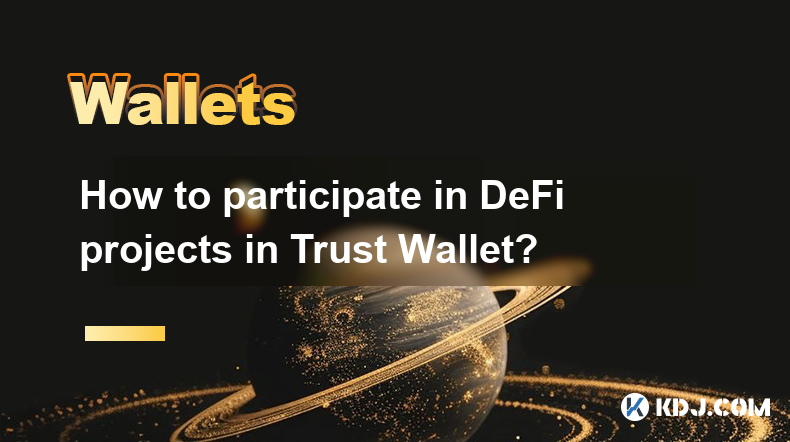
Understanding DeFi and Trust Wallet's Role
Trust Wallet, a popular mobile cryptocurrency wallet, offers convenient access to a range of decentralized finance (DeFi) applications. DeFi projects operate on blockchain networks, offering services like lending, borrowing, staking, and yield farming without intermediaries. Trust Wallet acts as a gateway, allowing you to interact with these applications directly from your mobile device. It's crucial to understand that DeFi carries inherent risks, including smart contract vulnerabilities and market volatility. Always research thoroughly before participating.
Connecting Trust Wallet to DeFi Platforms
Before interacting with any DeFi project, you need to connect your Trust Wallet to the specific DeFi platform's interface. This typically involves the following steps:
Open the Dapp Browser: Most DeFi interactions happen through decentralized applications (dApps). Trust Wallet has a built-in Dapp browser. Locate and open it within the app.
Navigate to the DeFi Platform: In the Dapp browser, enter the URL of the chosen DeFi platform (e.g., Uniswap, PancakeSwap). Ensure you are using the official and verified website to avoid scams.
Connect Your Wallet: Once on the platform's website, look for a "Connect Wallet" or similar button. Click it and select Trust Wallet from the list of available wallets.
Authorize Connection: Trust Wallet will prompt you to authorize the connection. Carefully review the permissions requested by the platform before confirming. Never connect your wallet to unverified or suspicious websites.
Participating in DeFi Activities within Trust Wallet
Once connected, you can explore various DeFi activities. However, the exact process varies depending on the specific platform and the activity. Here are some common examples:
Staking: Many DeFi platforms allow you to stake your cryptocurrencies to earn rewards. This typically involves locking up your assets for a specific period. The platform's interface will guide you through the staking process.
Yield Farming: This involves lending or providing liquidity to decentralized exchanges (DEXs) in exchange for earning interest or trading fees. The process involves adding liquidity to a liquidity pool. Understanding impermanent loss is crucial before participating.
Lending and Borrowing: Some platforms allow you to lend your cryptocurrencies to earn interest or borrow cryptocurrencies against your collateral. Carefully assess the risks associated with borrowing, including liquidation risks.
Decentralized Exchanges (DEXs): Trust Wallet allows you to use DEXs directly. This enables you to swap tokens without relying on centralized exchanges. Always verify the contract address of the token you are trading to avoid scams.
Security Considerations When Using Trust Wallet for DeFi
Security is paramount when using DeFi. Here are some essential security measures:
Use a Strong Password: Choose a strong and unique password for your Trust Wallet. Avoid reusing passwords across different accounts.
Enable Two-Factor Authentication (2FA): This adds an extra layer of security, making it significantly harder for unauthorized individuals to access your wallet.
Regularly Update Your Wallet: Keep your Trust Wallet app updated to benefit from the latest security patches and bug fixes.
Only Use Verified DApps: Always double-check the URL and legitimacy of any DApp before connecting your wallet. Beware of phishing attempts and fake websites.
Beware of Phishing Scams: Be cautious of suspicious emails, messages, or websites claiming to be associated with DeFi platforms or Trust Wallet. Never share your seed phrase or private keys with anyone.
Understanding Risks Associated with DeFi
DeFi projects are innovative but inherently risky. Understanding these risks is crucial before participation:
Smart Contract Risks: Bugs or vulnerabilities in smart contracts can lead to loss of funds. Always research the project's security audits and community reputation.
Market Volatility: Cryptocurrency prices fluctuate significantly, impacting the value of your assets in DeFi protocols.
Impermanent Loss: This risk is particularly relevant to liquidity providers on DEXs. It refers to the potential loss incurred when the price of assets in a liquidity pool changes relative to each other.
Rug Pulls: This refers to fraudulent projects where developers abandon the project and take the users' funds. Thorough research and due diligence are essential to mitigate this risk.
Common Questions and Answers
Q: Is it safe to use Trust Wallet for DeFi?
A: Trust Wallet itself is a relatively secure wallet, but the DeFi protocols you interact with carry risks. Using best security practices, such as strong passwords and 2FA, is crucial. The inherent risks of DeFi, such as smart contract vulnerabilities and market volatility, remain regardless of the wallet used.
Q: What are the fees involved in using DeFi through Trust Wallet?
A: Fees vary depending on the specific DeFi platform and the transaction type. You'll typically pay gas fees (transaction fees on the blockchain) and potentially other fees charged by the DeFi platform itself. These fees are usually paid in the native cryptocurrency of the blockchain.
Q: Can I use Trust Wallet with any DeFi platform?
A: Trust Wallet supports a wide range of DeFi platforms, but not all. Check the platform's documentation to ensure compatibility. Many popular DeFi platforms are supported, but always verify compatibility before attempting to connect.
Q: What happens if I lose access to my Trust Wallet?
A: If you lose access to your Trust Wallet, you may lose access to your cryptocurrencies, unless you have a backup of your seed phrase. Never share your seed phrase with anyone. It is your responsibility to securely store your seed phrase.
Q: How do I choose a reputable DeFi project?
A: Research is paramount. Look for projects with transparent teams, audited smart contracts, a strong community presence, and a proven track record. Be wary of projects promising unrealistic returns or lacking transparency. Consider the project's whitepaper and look for independent reviews and audits.
Disclaimer:info@kdj.com
The information provided is not trading advice. kdj.com does not assume any responsibility for any investments made based on the information provided in this article. Cryptocurrencies are highly volatile and it is highly recommended that you invest with caution after thorough research!
If you believe that the content used on this website infringes your copyright, please contact us immediately (info@kdj.com) and we will delete it promptly.
- The broader crypto market witnessed a rebound today
- 2025-04-02 23:55:12
- 3 Oaks Gaming Enters the UK iGaming Market Through a New Partnership with BVGroup
- 2025-04-02 23:55:12
- XRP Price Has Continued To Stay In The Red, Consolidating In The $2.10 Range Over The Past Few Days
- 2025-04-02 23:50:12
- Is Kaspa (KAS) Still Worth Holding in 2025 Despite Prolonged Struggles?
- 2025-04-02 23:50:12
- Circle Labs Inc. (USDC) IPO Filing Sheds Light on Its Relationship with Coinbase
- 2025-04-02 23:45:12
- Seamless Migrates Its Entire Infrastructure to Morpho Labs
- 2025-04-02 23:45:12
Related knowledge
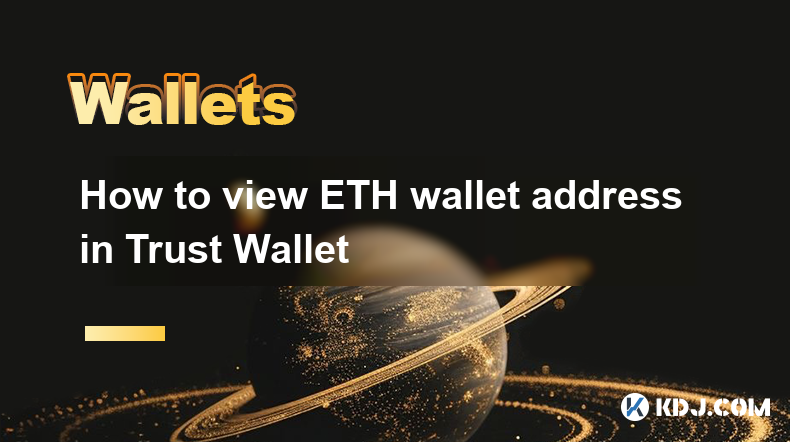
How to view ETH wallet address in Trust Wallet
Apr 02,2025 at 10:56pm
Managing your Ethereum (ETH) wallet address is crucial for anyone involved in the cryptocurrency space, especially when using popular mobile wallets like Trust Wallet. This guide will walk you through the process of viewing your ETH wallet address in Trust Wallet, ensuring you can confidently engage in transactions, receive funds, and manage your digita...
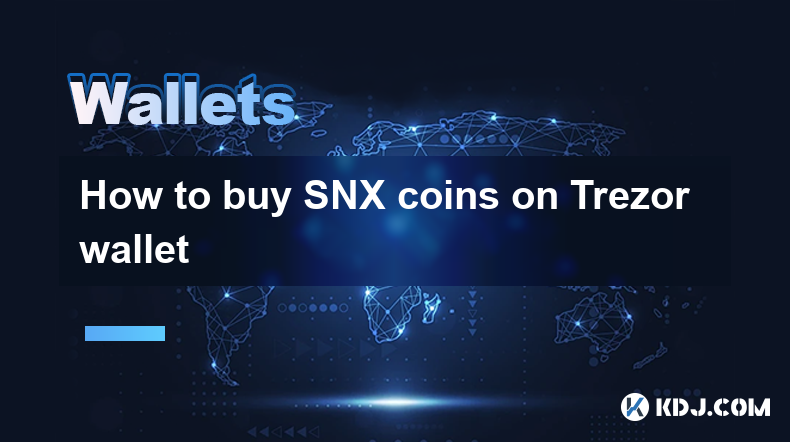
How to buy SNX coins on Trezor wallet
Apr 02,2025 at 10:00pm
Buying SNX coins, also known as Synthetix Network Tokens, using a Trezor hardware wallet involves several steps to ensure secure and efficient transactions. Trezor wallets are renowned for their security features, making them an excellent choice for storing and managing cryptocurrencies like SNX. In this guide, we will walk you through the process of pu...
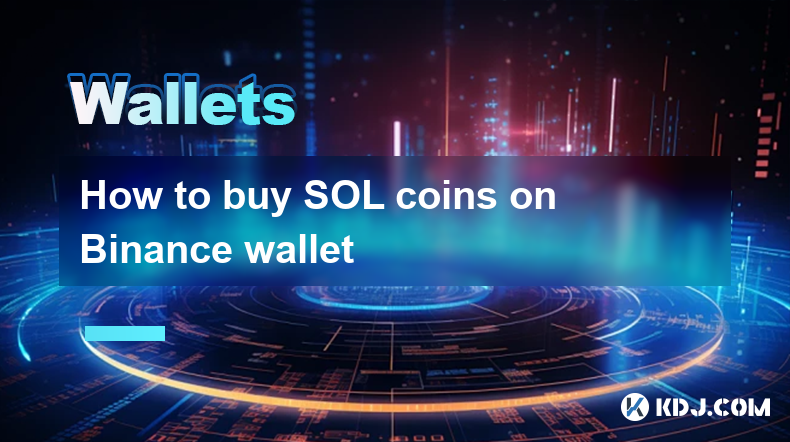
How to buy SOL coins on Binance wallet
Apr 02,2025 at 11:14pm
Buying SOL coins on Binance is a straightforward process that can be completed in a few steps. SOL, the native cryptocurrency of the Solana blockchain, is known for its high throughput and low transaction costs, making it an attractive option for many investors. Before you start, ensure you have a Binance account and have completed the necessary KYC (Kn...
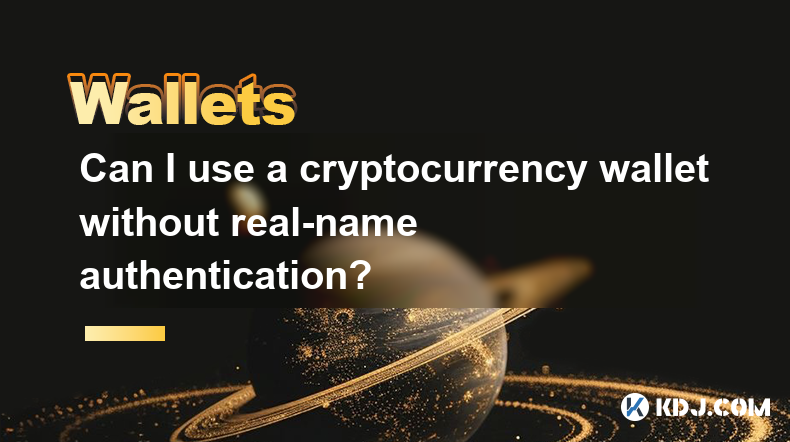
Can I use a cryptocurrency wallet without real-name authentication?
Apr 02,2025 at 03:14pm
Cryptocurrency wallets have become increasingly popular as digital assets gain traction in the financial world. One of the key concerns for many users is privacy, leading to the question: The answer to this question varies depending on the type of wallet and the specific platform or service being used. In this article, we will explore the different type...
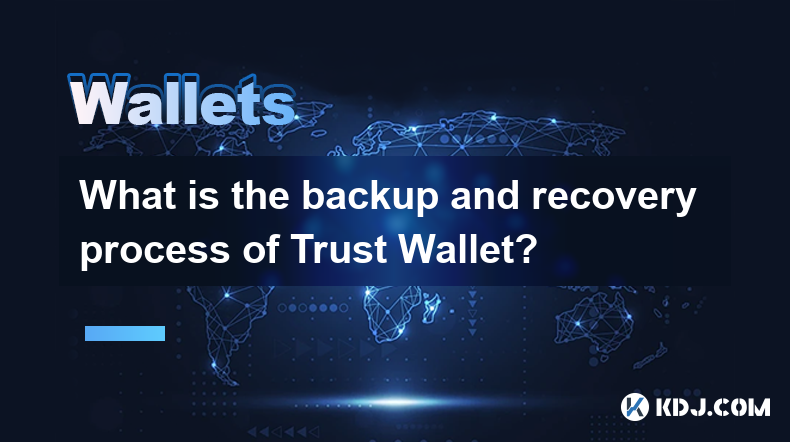
What is the backup and recovery process of Trust Wallet?
Apr 02,2025 at 04:21pm
The backup and recovery process of Trust Wallet is essential for ensuring the safety and accessibility of your cryptocurrency assets. Trust Wallet, a popular mobile wallet, offers a straightforward method to secure your funds through a process that involves creating a backup of your wallet using a recovery phrase. This recovery phrase, also known as a s...
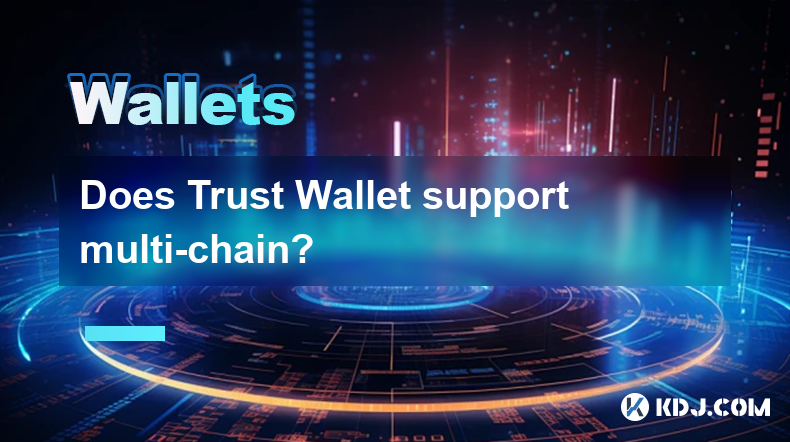
Does Trust Wallet support multi-chain?
Apr 02,2025 at 06:00pm
Trust Wallet, a popular mobile cryptocurrency wallet, has gained significant attention for its user-friendly interface and robust security features. One of the key questions users often ask is whether Trust Wallet supports multi-chain functionality. This article delves into the specifics of Trust Wallet's multi-chain support, exploring the various block...

How to view ETH wallet address in Trust Wallet
Apr 02,2025 at 10:56pm
Managing your Ethereum (ETH) wallet address is crucial for anyone involved in the cryptocurrency space, especially when using popular mobile wallets like Trust Wallet. This guide will walk you through the process of viewing your ETH wallet address in Trust Wallet, ensuring you can confidently engage in transactions, receive funds, and manage your digita...

How to buy SNX coins on Trezor wallet
Apr 02,2025 at 10:00pm
Buying SNX coins, also known as Synthetix Network Tokens, using a Trezor hardware wallet involves several steps to ensure secure and efficient transactions. Trezor wallets are renowned for their security features, making them an excellent choice for storing and managing cryptocurrencies like SNX. In this guide, we will walk you through the process of pu...

How to buy SOL coins on Binance wallet
Apr 02,2025 at 11:14pm
Buying SOL coins on Binance is a straightforward process that can be completed in a few steps. SOL, the native cryptocurrency of the Solana blockchain, is known for its high throughput and low transaction costs, making it an attractive option for many investors. Before you start, ensure you have a Binance account and have completed the necessary KYC (Kn...

Can I use a cryptocurrency wallet without real-name authentication?
Apr 02,2025 at 03:14pm
Cryptocurrency wallets have become increasingly popular as digital assets gain traction in the financial world. One of the key concerns for many users is privacy, leading to the question: The answer to this question varies depending on the type of wallet and the specific platform or service being used. In this article, we will explore the different type...

What is the backup and recovery process of Trust Wallet?
Apr 02,2025 at 04:21pm
The backup and recovery process of Trust Wallet is essential for ensuring the safety and accessibility of your cryptocurrency assets. Trust Wallet, a popular mobile wallet, offers a straightforward method to secure your funds through a process that involves creating a backup of your wallet using a recovery phrase. This recovery phrase, also known as a s...

Does Trust Wallet support multi-chain?
Apr 02,2025 at 06:00pm
Trust Wallet, a popular mobile cryptocurrency wallet, has gained significant attention for its user-friendly interface and robust security features. One of the key questions users often ask is whether Trust Wallet supports multi-chain functionality. This article delves into the specifics of Trust Wallet's multi-chain support, exploring the various block...
See all articles

























































































